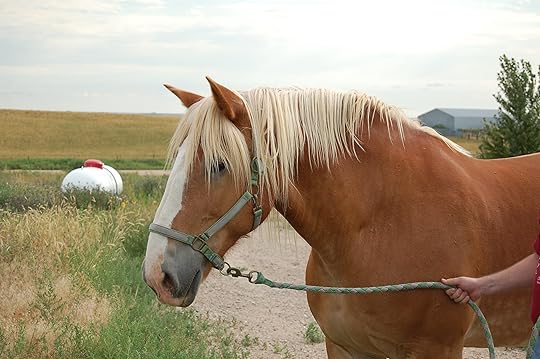Brain-biter and Bansh: On the Naming of Things
I’m currently listening to Hereward the Wake, a historical novel twice over (one set in a historical period, and written, from our perspective, in a different one). Our hero has just won his sword, in grand Viking tradition, by slaying its former owner after the disputed princess has hidden the sword, a famous blade said never to miss, called “Brain-biter.” There’s a nice image for you. And it got me thinking about how we signal priority by what we name.
A noble steed named Aramis, after a character in The Three Musketeers.
The naming of things accords them a sort of respect not always due to the unnamed equivalents. Names indicate the dignity of the individual, and, in many cultures, are accorded power in and of themselves. Hence stories in which the hero will not reveal his name for fear it be used against him, and those in which people are stripped of their names as a way to prove power over them. The giving of names is an important ritual of birth or coming-of-age, and entry into religious orders, or the conferring of knighthood or a royal crown may be sealed by the addition of a name, or the use of new name entirely. So to name a thing is to give it honor and to welcome it into the life of the clan, the party, the history of man.
The concept of the famous sword goes back centuries. Possibly the most famous of named swords is Excalibur, the legendary blade of King Arthur of Britain. The northern epic tradition includes a number of such swords, partnered with great warriors–a tradition carried on in many fantasy novels that arise from that root. In The Hobbit, Gandalf and Thorin adopt swords from Gondolin, which come with names of their own (“Foe-hammer” and “Goblin-cleaver”), and Bilbo imitates this grand legacy by dubbing his own short blade, “Sting.” Sting goes on to carry out the duties of a warrior’s weapon, smiting great foes and referred to thereafter by its name, as if it were a character in its own right. Samurai narratives also include such famous blades, entitled to their own name and history. The names are often, like “Brain-biter,” intended to suggest the might of the bearer, but a named weapon also carries its own set of stories, which may, in fact, be separate from the life of any one bearer.
The other example in my title is the name of a horse, from Elizabeth Bear’s Range of Ghosts, an epic fantasy in the Mongolian tradition. In that realm of steppes warfare and hard winters, a man’s horse is often his closest companion, and horses serve as the second lead in many a tale of Mongolian exploits, so I was pleased to see Bear paying homage in this particular way. However, the translation of the horse’s name, Bansh, is “dumpling,” hardly the moniker of a noble steed. The more the horse proves herself in various adventures, the more those around them question this unusual and somewhat undignified name. Bear both honors the tradition of the named steed and pokes fun at the same time.
The authors out there will know, and the readers will understand, that to name a character in a book is to endow that person with a life beyond obscurity. The individual is thus distinguished from a crowd, whether it is a crowd of unwashed masses, an armory of ordinary weapons, or a herd of horses. Names are powerful, especially when we gift them to those who lack the voice to claim their own.





